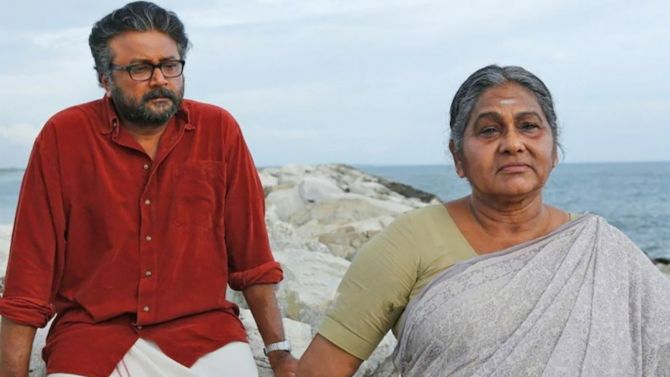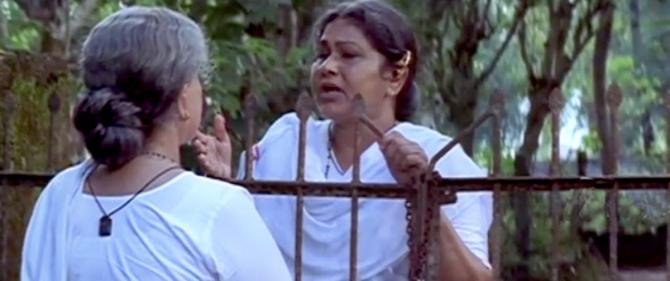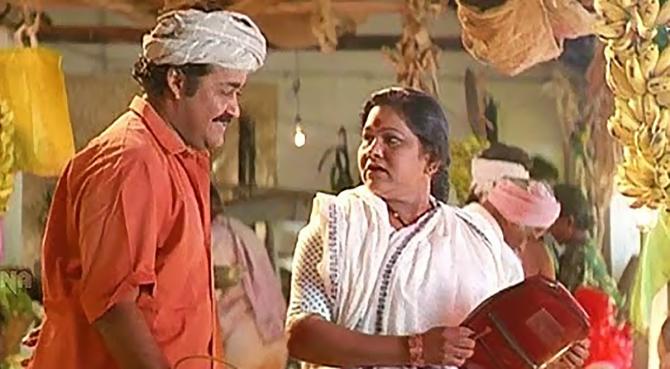KPAC Lalitha's specialty was evoking on screen people that the audience felt they knew intimately, and evoking them through telling details that tore down the boundary between the audience and the performer, observes Sreehari Nair.

In a forum of cinema lovers, when someone starts talking about relating to this or that movie, it's usually a good time to make haste and get off the premises.
'I related to that movie about an engineering student who overcomes academic failures, heartbreaks and a hundred bad habits to finally come of age.'
'I so related to that tale of a girl who, although from a broken family (her father was a creep, her mother a drunk), makes out in the society all by herself.'
Often, when people use the term 'I related to' with respect to a movie, it's an indication that they see in the broad arc of the movie's storyline their inflated ideas about themselves being neatly reflected.
The man who had everything, lost it, then got it back; the whimpering dame who found her voice in the big bad world -- oh, who doesn't relate to such stories?
But there's another kind of 'relating to' that happens at the movies.
One very different from crude self-projections, one that's of a premium kind almost, brought about by actors who build their characters through a steady accumulation of original details carefully culled from life.
And it is at this premium level that the audience related to KPAC Lalitha.
Lalitha was one-third of a triumvirate (along with Meena and Philomena), who could be fascinating even while being plain irritable, beautiful even while being plain harpy.
And to achieve this impossible ideal, she didn't have to go bonkers like the other Lalita, Lalita Pawar.
She didn't have to play fiends or evil matriarchs.
KPAC Lalitha's specialty was evoking on screen people that the audience felt they knew intimately, and evoking them through telling details that tore down the boundary between the audience and the performer.
When she would scratch her head while leaning into a conversation, I swear she was one of my Kunjammas (I hadn't noticed my Kunjamma doing this, until Lalitha pointed it out to me).
It's in Thalayana Manthram, I think, where you see her handing out a bottle of hair oil to her daughter-in-law, and just before performing this simple transaction, she shows the presence of mind to open the cap of the bottle and catch a quick whiff.
It's a minor manipulation of screen time that she effects at that point, and in the movie, it whizzes past you without so much as a murmur.
But then, that whiff becomes the critical difference between a scene that dies on the page and one that takes you back to those Kerala kitchens where the sound of a stone grinder frequently competes for your attention with an aging mother's somber whines.
In Pavithram, she bites her fingers in appreciation of an unplanned jest, the action causes her to recoil in the knowledge that she had been crushing green chillis, and she turns away from the screen as if unable to face the viewer.
I don't anymore watch those movies in their entirety, but I make it a point to pause during moments like the ones mentioned above, moments which prove that snapshots from my own life could have unexpected cinematic resonance.

Always drawing from life yet always defying expectations, Lalitha never seemed to enter a room or open a door in a manner that felt diagrammed or charted out by a film-maker.
In the same vein, her cries never hit you like acts of piety; they were full of sulfur and mucus and feelings that were too good for words.
And it was this commitment to never selling short her characters's emotions that allowed her to switch between states with grace.
That allowed her, in Thenmavin Kombath, for instance, to go from wisecracking one moment to conveying the yearnings of a long-suffering lover the next.
It was KPAC Lalitha's everywoman toughness and ecstasy that Sathyan Anthikad employs as a shrewd counterpoint in Manasinakkare, when he gives us a shot of her walking away through the courtyard, snuffling, deeply wounded, and walking away just like that and out of the picture.
But the 'big numbers' as far as Lalitha was concerned, were mere asides for the viewer to relax and exhale for a modest bit.
The real deal was the breathless array of little things she would use to construct a character.
How a child would fasten itself to her waist as though it were an outgrowth of the bearer's body.
How the randomly raised fist fell on her breast.
How the cup of tea she intended to cool went round and round in her hands.
How she pinched the underside of an over-curious daughter's arm.
How her face twisted in the middle of a sentence so that you realised that while she was gossiping about a neighbour she was also, simultaneously, wringing clothes to put out on a clothesline.

Arguably, the greatest actress of rapture in Indian Cinema, she didn't always need close-ups or dialogues to shine.
She could be somewhere in the background, silently removing coconut husk with a grimace, or scraping tapioca for dinner, and you could sense her presence, like a glow at the back of a sullen cave.
Yet, for all those wordless splendors, how rhapsodically she could tell you off.
Oh, how she could curse you away.
How she could go on talking while at once engaged in licking clean a plantain leaf.
Her voice could contain five questions arbitrarily plucked from the air while still imbued with the power to put the cheeriest of thinkers to shame -- as a certain Basheer comes to realise in Adoor Gopalakrishnan's Mathilukal.
Yes, she boomed over high walls and emerged from crevices, out-blazed fireplaces and flitted like a firefly through cobwebbed chambers.
The death of a great performer is never anything less than personal.
In the last two years, beginning with Irrfan to be precise, we have been witness to more than a few such deaths.
But this one, it just feels close to home.











